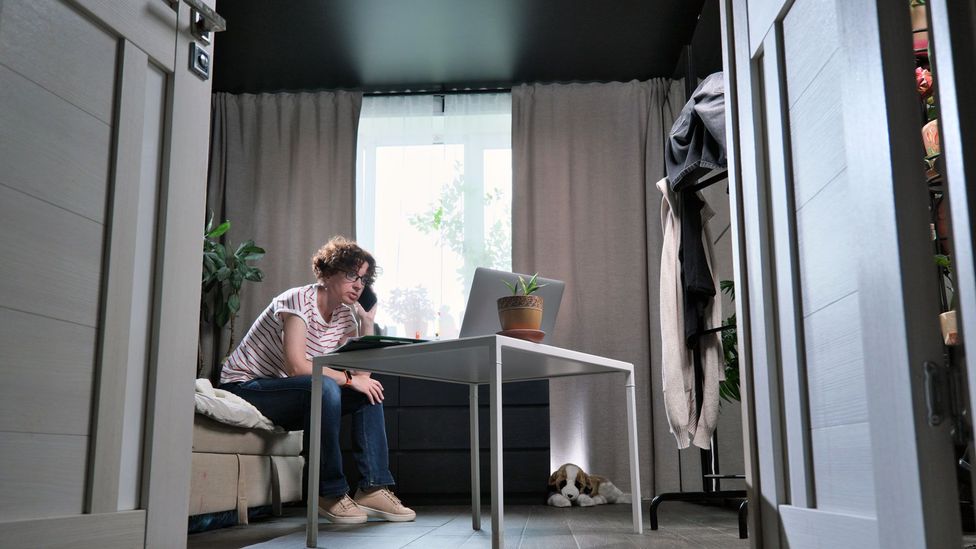Hybrid has been heralded as the future of work. Research shows the majority of employees want their organisation to offer a mix of remote work and in-office time, and many see the hybrid workweek model as a path to better work-life balance.
Right now, companies around the world are experimenting with different types of hybrid set-ups, to see what suits their organisation best. Some companies remain on the fence, and when the possible downsides of hybrid work are discussed, most people generally assume pushback will come from the companies who decide it doesn’t suit their needs.
But there could be reason to believe employees may actually be the ones who fall out of love with hybrid, despite its widely touted advantages.
Employees who often work from home could perceive a negative impact on their career, linked to a lack of interaction with colleagues and managers. Those who want to climb the ladder could feel compelled to spend more time in the office, so they’re visible to the powers that be. Some people, meanwhile, could experience difficulties switching seamlessly between home and office work environments.
It’s possible, some experts suggest, once we’ve tried hybrid arrangements for a while, some might find the set-up a less attractive option.

Younger workers particularly may increasingly reject remote-work arrangements, as they don't have ideal set-ups for ergonomic working (Credit: Getty Images)
Why hybrid’s appeal may fade
First, the daily reality of juggling two workspaces could prove frustrating for workers.
“For the employees themselves, it is almost impossible to set up two workspaces that are well-equipped for all the different work tasks they need to do – books or other information sources are always in the wrong place, or they don’t have a photocopier or fax at home,” says Anita Woolley, associate professor of organisational behaviour and theory at Carnegie Mellon University in Pennsylvania, US.
“So, no matter where they are working, they are almost always someplace trying to do something without some necessary tools.” Even if employees are able to choose their working location every day, Woolley says “it is nearly impossible to schedule tasks such that you are in the best place to complete them”.
Of course, some people may believe that these are inconveniences worth putting up with. But others – particularly younger workers with poor home-working set-ups – may well feel that the office is a better place for them to be productive. And some workers may feel like they genuinely collaborate more, get more done and come up with better ideas when they’re able to communicate freely in person with their colleagues, especially when they’re just a swivel of an office chair away. So, even if an employer offers remote-work days, some people may come in, anyway – or at least more than the minimum days mandated by management.
Additionally, even if workers are highly productive at home, they risk no-one noticing that output. Without regular, sustained input from managers, employees who spend more time working remotely could begin to feel that they might become undervalued, even dismissed, if they continue spending less time in the office.
“[As a manager], I begin to say to myself: ‘Remind me, who’s Bryan? Can we not replace Bryan with cheaper labour someplace?’” says Anat Lechner, clinical associate professor of management at New York University.
Even if more staff are working from home more frequently than they did before the pandemic, the possibility of feeling marginalised, invisible and expendable is real – and some workers will take steps to avoid that. “People who are afraid of being totally forgotten will want to go into the office,” adds Lechner.
The power of facetime
Along with logistics, getting face-to-face with colleagues plays a major part in where people want to work.
Employees will likely feel compelled to go into the office to connect with their colleagues; making those social connections that facilitate workplace communication among teams, and make the work experience more enjoyable. Research shows people who feel more connected to their colleagues report a better overall experience at work, and that feeling lonely or disconnected from others has a correspondingly negative effect.
But employees will also have another crucial reason to get facetime in the office: climbing the career ladder. Studies have long shown the effect of ‘proximity bias’, means that workers who spend more time with managers are more likely to rise through the ranks. While it leads to problems like presenteeism and burnout, experts believe that some workers will think that showing up to the office is a sacrifice worth making, if they want to get ahead.

Workers may find they're going back into the office more than usual, even as they've requested increased flexibility during the pandemic (Credit: Getty Images)
Research chimes with these concerns: studies show that in-person workers are more likely to get promoted. Remote working also hinders workers' ability to network and meet new people; research has shown that during the pandemic, professional and personal networks alike shrunk by 16%. It’s unclear whether connections will contract in a long-term hybrid situation, too – but it’s clear that the less time you’re spending in the office, the harder it is to advance your career, whether it’s buttering up your boss or introducing yourself to others in the industry.
“If I’m looking for a promotion, it’s in my strategic interest to be present,” says Loran Nordgren, professor of management and organisations at Kellogg Business School at Northwestern University, in Illinois, US.
To that end, if companies don’t set clear expectations about who comes into the office on which days – or limit the number of days people can come in – some staff might come in more than others to chase those promotions. The result of this, believes Nordgren, is that hybrid could fade out quickly once it’s recognised by employees as a working model that could potentially slow career growth.
“Forget about the stated policy,” he says. “It’s really what the underlying reward systems are that are going to guide what people do.”
Ultimately, experts and workers alike have painted the hybrid work set-up as almost universally desirable – an inevitable model for the future of work. Workers want the arrangement – but, as companies around the world are still rolling out a patchwork of various return-to-office strategies, we don’t actually know how long they’ll want it.
In the immediate, experts suggest employers need to keep a pulse on how workers are feeling about the hybrid-work model – and make sure they’re actually building new workplaces that support it. This means thinking extremely carefully about logistics, including proper scheduling, good project management tools, effective communication and more. Otherwise, some workers may find the new normal more frustrating than flexible.
"work" - Google News
September 21, 2021 at 03:03AM
https://ift.tt/3krofHT
Why workers might eventually reject hybrid work - BBC News
"work" - Google News
https://ift.tt/3bUEaYA
Bagikan Berita Ini














0 Response to "Why workers might eventually reject hybrid work - BBC News"
Post a Comment